Pour voir un entretien avec Joël Vallat, Proviseur du Lycée Louis Le Grand (France), réalisé le 27 octobre à l’Université de Maurice suite à sa conférence sur ‘L’Education au XXIè siècle et former à l’excellence’, cliquer sur:
http://comstudies.wordpress.com/2009/11/20/leducation-au-xxie-siecle-joel-vallat/
La conférence était organisée par le Département de Français de la Faculté des Sciences Sociales et Humaines en collaboration avec l’Ambassade de France.
Uncategorized
Talk on News Media, New Media and Elections
The US Embassy in collaboration with the Communication Studies Unit of FSSH is organisinf a talk on the above theme by Ellen Hume, US Media expert, on Thursday, October 22, 2009 from 12 30-14 00 hours at the University of Mauritius.
The talk will the held in the old Engineering Building in Lecture Theatre 1 (to access, take the lift in the New Engineering Tower to the second floor, then take the long corridor on the left. LT1 is on the right at the end of the corridor).
Read the rest on the UoM-Communication Studies blog.
Diksioner Morisien d’Arnaud Carporan
Ene ti mesaz Arnaud Carporan ki mo ena plezir difizer isi:

Invitasion nasional pou enn partisipasion dan
deziem edision premie diksioner kreol monoleng
Koleksion Text Kreol pe anons bann Morisien ki stok premie edision Diksioner Morisien finn epwize. Nou remersie tou dimounn (etidian, partikilie, lapres, institision, etc.) ki finn permet sa premie lavantir-la vinn enn sikse lor plan nasional, rezional ek internasional.
Nou finn deza rant dan faz preparasion deziem edision. Nou pe lans enn lapel nasional pou ki sak Morisien ki anvi kontribie ladan kapav fer li. Zot kontribision kapav dan form :
1. Koreksion lor bann definision ki ena dan premie edision;
2. Propozision lor bann mo ki manke dan premie edision.
Dat limit pou kontribision : 31 oktob 2009
Kontribision kapav fer direkteman lor
ouswa par SMS lor enn sa bann nimero-la :
7954652; 7597095; 7522908.
Pou plis detay, pa ezite kontakte nou.
Mersi.
Dr Arnaud Carpooran
Responsab proze

Results of the African Media Barometer for Mauritius

As announced yesterday, the African Media Barometer was launched today at the University of Mauritius by Oliver Dalichau of the FES (Friedrich Ebert Stiftung). There was a very small attendance but we hope that this will mark the first stage for wider dissemination of the report to all actors involved or interested in the Mauritian mediascape. Actually, hard copies of the report will be circulated with the members of parliament as we feel that it is important that they be sensitised to issues related to press freedom and regulation as decision-makers.
Soft copies will also be sent to prominent actors of the civil society, including NGO’s, associations and of course, the media. In fact, I am putting a copy online so everyone can get access to it. Please feel free to disseminate and, of course, to comment. I personally think that it is through discussions, dialogues, exchanges of ideas that we can progress collectively as a democratic society.
Also, as promised, here are some of the key findings of the AMB exercise which was conducted for the first time in Mauritius in August 2008. The next exercise will be done in 2010 in order to monitor progress made on the benchmarks.
Key results
In a nutshell, members of the panel (5 from the media and 5 from civil society) assessed the performance of Mauritius on the 4 main sectors as follows:
Sector 1: Protection and promotion of freedom of expression, including freedom of the media. Score: 2.7
Sector 2: Diversity, independence and sustainability of the media. Score: 2.9
Sector 3: Transparency and independence of broadcasting regulation whereby the state broadcaster is transformed into a truly public broadcaster. Score: 2.6
Sector 4: Levels of professional standards practiced by the media. Score: 3.0
Overall country score: 2.8
Note: The minimum score of 1 means the country does not meet the indicators and the maximum score of 5 means it meets all aspects consistently over time.
Areas which seem to warrant the most attention are:
– The nomination of members of regulation authorities for the audiovisual sector (which should be more transparent, open and should include civil society)
– The editorial independence of the MBC (and thus stop this silly lapdog attitude towards the government of the day and engage in real journalism to service the public, not politicians)
– The use of advertising placements by government in the media (which should not be used by governing parties to reward lapdogs and punish the others)
– The inactivity of press associations and civil society (which should all work towards promoting freedom of expression for all instead of their own vested interests)
– The lack of professional media associations and trade unions (can the journalists, columnists and chief editors stop bickering?)
So, what do we do from there? Well, let’s hope our politicians will read this report seriously and stop their silly antics against the press, that the media people will also stop engaging in silly wars against their own and not fall in the traps set by the politicians and that the population will start thinking in a mature and rational way and also use its power to shape the public debate.
Of course, comparatively speaking we are not so bad if we compare with many other countries of the developing or least developed world. But, we also have lots of room for improvement and we need to focus on making progress.
Here’s a copy of my presentation
and a copy of the 2008 AMB report for Mauritius
The report is also available on the website of the FES Madagascar at: http://www.fes-madagascar.org/pages/francais/publications.php
Launching of African Media Barometer for Mauritius
Tomorrow, the African Media Barometer for Mauritius will be launched at 10 a.m. in Lecture Theatre 2 of the University of Mauritius.
Mr Dalichau, Representative of the FES (Frierich Ebert Stiftung Foundation), will launch the report in the presence of the media. I will present key findings of the report and a journalist, Sunil Gopal, will speak about his experience.
The African Media Barometer is a qualitative tool for assessing the media on the African continent. It has been conducted for the first time in Mauritius in 2008.
I will write more about the findings after the launch.
My trip to Madagascar
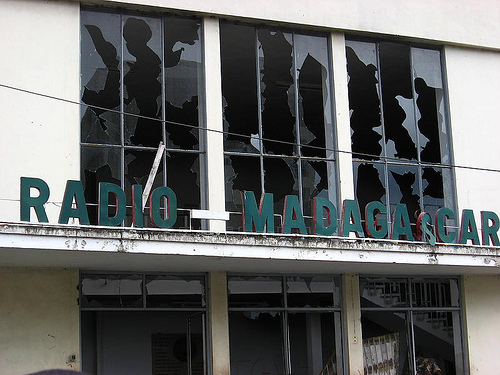
I was in Madagascar for three days last week upon an invitation of the FES (Friedrich-Ebert-Stiftung Foundation) to make a presentation on Freedom of Expression and of the Press at a workshop and to meet with local journalists. It was an eye-opening experience to witness all the difficulties faced by the local population and the journalists as well as other actors of civil society.
The political situation was very unstable and there were many crowd manifestations in town on the ‘Place du 1er Mai’ with some violent confrontations with the police resulting in many deaths, injured and arrests. Luckily, we were away from the hotel (which is just a few minutes walk from the hotspot) during the protests (which only take place between 11 a.m. and 4 p.m. according to a local friend). But, I did see the pictures and reports in the local press which were quite alarming.
The workshop which targeted potential young leaders in Madagascar went on well with a wide variety of participants (from ministries, courts of justice, NGOs, private sector and the press). There were even mothers with their babies as the FES favours a gender approach and thus hosts the women participants and a nurse for their babies to allow them to attend the working sessions.
Malagasy Journalists under pressure
The next day, we also met with some local journalists to discuss about press freedom in Mauritius and Madagascar. Many could not attend due to the political crisis, some had even been called by the Ministry for some explanations about their coverage of the protests. Journalists work under a lot of pressure and have very small salaries and virtually no safety net. One leading blogger journalist even said she had been interrogated once by the police for being suspected of allegiance to an ex-vice PM. Yet, paradoxically, though our press looks freer than theirs, they have lots of private TV stations whereas we have none. They have an ‘Ordre des Journalistes’ which we do not have. It would seem they have the proper framework but application is lacking and political tensions override the democratic system.
Before the workshop, we visited the remains of Radio Madagascar and TVM, which were both burned down by rioters in January. Radio Madagascar is not functioning any more as it is completely devastated but TVM is operating a minimum service with equipment recuperated from the presidential palace and personal equipment brought in by the journalists themselves. They had apparently just received state-of-the-art equipment a few months ago, which had been funded by a German organisation, all of which have vanished into black fumes.
Overall, it was a very enriching experience despite the crisis. It was sad to see the poor people living and working on the streets in very extreme conditions which make our island look like a very very modern country. But, at the same time, one could sense that there is enormous potential for development. It will all depend on how the political decision makers sort out their problems and decide or not to help their people and lift the country out of poverty…
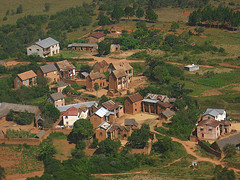
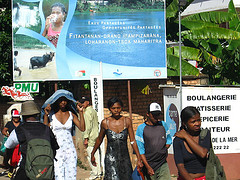
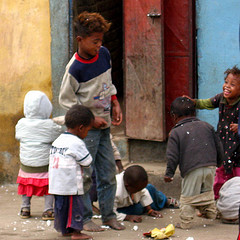
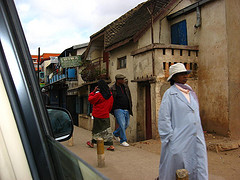
You can see more pics of the trip on Flickr at http://www.flickr.com/photos/noulakaz/sets/72157617434114366/